- Home
- Jayne Anne Phillips
Fast Lanes Page 6
Fast Lanes Read online
Page 6
“Are you going to beat me, Thurman?”
“Pull off, right now.”
I pulled off on the berm and shifted into neutral. A cattle truck passed us doing eighty, rocking the cab. There was a bawl and a smell and it was gone. Thurman sat with his back to the passenger door. “Take your hands off the wheel,” he said.
“Thurman, what is this?”
“I’ll tell you what it is. You’re in trouble, and no fast lane is going to help.”
“I don’t want help. I’ll just keep going until I find a way to get off.”
“Good for you, sweetheart.”
“Screw you.”
“Hey, don’t worry. You’ll get no help from me. Last time I quit fast lanes I made myself a promise—no more Samaritan crap.”
“You’re all heart.”
“You’d better worry about your own heart. You’re the one with the racing pulse and the shakes, sleeping on floors and getting picked up by three jokers in a disco.”
“OK, Thurman.”
“Not OK. I’ve been there, I know what you’re doing. You spend half your time in a full-throttle heat and the other half holding on when you realize how fast you’re going. You don’t even come up for air. Your insides are blue because you’re suffocating. Your guts shake because you scare yourself. You get close enough to see death doesn’t give a shit about you.”
I turned off the ignition and the truck was silent. Noises of the highway went by, loud vibrations that took on the quality of musical tones. I don’t know how long we sat there, maybe only a few minutes.
“Death isn’t supposed to give a shit,” I said, “is it? Death is a zero. Blue like ice is blue. Perfect. Barnes is perfect. Your father will be perfect, my father. All of us, cold and perfect.” Thurman moved close to me across the seat. We were both sweating. He pulled his damp T-shirt away from his body and touched the cloth to my face. I whispered, as if someone were listening to us, “I don’t mind the heat. I guess I want the heat.”
“I know, I know. And we got heat. We got plenty of heat for you here in the USA.”
The cotton of his shirt was soft and worn. “Let’s drive,” I said. “Who’s driving?”
“What the hell. You drive.”
“Do you want me to stay in the slow lane?”
“I don’t care. Drive on the berm, drive up the median, drive upside down.”
I pulled onto the highway with a few jerks but no grinding of gears. Thurman turned the radio back on to a gospel broadcast. There was a choir singing strong and heavy about a land on high in the sunshine; their group vibrato wavered in the dashboard.
“You’re something else,” came Thurman’s voice. “You never did take your fucking hands off the wheel.”
“I guess I didn’t.”
“Jesus. I don’t know why I should worry about you. You’ll probably come out of this with a new refrigerator and a trip to Mexico.”
“Sure I will. A trip to the Gringo Hotel in Juárez, where they eat dog and hand out diseases.”
He lit a cigarette and gazed out the window.
Close to home, we drove through Virginia mountains in the rain. I had moments of total panic in which I seemed to be falling, spread-eagled, far away from myself, my whole body growing rapidly smaller and smaller. I could feel the spinning, the sensation of dropping. I held tightly to the door handle and concentrated on the moving windshield wiper in front of me, carefully watching its metal rib and rubber blade. I willed myself into the sound, the swish of movement and water, dull thwack as the blade landed on either side of its half-rotation. Runnels of rain and the tracks of their descent took me in; I could smell rain through the glass, smell clean water and washed leaves. I sat very still and the spinning of my own body slowed; the aperture of my senses widened, opened in a clear focus. Then I could feel the seat under my hips again and my feet on the floor of the truck, the purr, the vibration of engine. The capsule of the truck’s cab existed around me: damp leather, a faint musk of bodies. Close to me, Thurman would be humming tunelessly to himself, staring ahead into the rainy mountains and the twisting road.
The last night, we camped out in a National Forest. Nearly dusk already, and the ground was damp; I raked leaves into a broad pile to make us a softer bed, provide some insulation. The mountains and the air smelled of autumn, soil, rich mulch.
“Sit down here and get warm.” Thurman piled more wood on the fire. “Enjoy the wide open spaces. Tomorrow you’re safe, if not sound. Remember safe? You’ll get used to it again real fast.” He blew into the fire, then leaned back and gazed at me through a wavering column of heat. “You scared?”
I touched the border of stones we’d built to surround the campfire. The stones were rough, and warming. “The shakes are coming, right now,” I told him. “I can feel them.”
“No,” he said, “you’re OK. I’m sitting right here looking at you.”
“You can’t always see them. Sometimes they’re just in my gut.”
He took one of my hands and squeezed it, then kneaded my palm and worked down each finger. He pulled hard on each joint and talked as though neither of us were paying any attention to how hard he was pulling. “You’re fine,” he said. “We’re going to lay down in the leaves and take some deep breaths, then all those jangles will go somewhere else.”
I closed my eyes and I could feel the shade creeping across the leaves. Leaves fell slowly at long intervals, dropping with a papery sound. “I think it’s better if I sit here and cry,” I said.
“You can’t. You’re not a crier.”
“Let me try. Tell me a bad story.”
“I got no bad stories.” He picked me up in his arms and knelt to put me on the ground. The leaves were thick under us, old leaves smelling of dry mud. “Only one story,” Thurman said. “We’ve been in that truck three weeks. A few more hours, and you’re home.” I remembered a song that used to play on AM radio when I was gawky and twelve, the tallest girl in the class. Be my little baby, Won’t you be my darling, be my baby now.… I laughed. That’s what I was, a baby, a frozen six-year-old baby going back to the start of the cold.
“Funny story, huh?” He kissed my eyes. “Don’t get hysterical. I won’t force you. Male pride, the Code—”
“You couldn’t rape anyone. You might get mad enough to start, but at the crucial moment your equipment would fail you.”
“You’re right. I was born with a kindly cock.” I felt his legs against me, his hard stomach, the buckle of his belt. He unfastened it to keep the metal from hurting me and touched me low on my hips.
“You get turned on when you’re paternal,” I said. “You’re going to be hell on your daughter.”
“You’re hell on me,” he said. “You’ll be someone’s good lover someday when I’m drinking beer alone in a tavern and hearing the pinball machines.”
I opened his shirt and pants and slid down against him. Lake smell, like Georgia, taste of a bruise. He was in my mouth, his hands in my hair, then he moved to stop me and turned my face up. He bent over me, holding my arms, his eyes angry and surprised and wet. “No,” he said.
“Thurman.” I was crying. “I just want you to drop me off tomorrow. Me and the suitcases and the box of books. I don’t want to see you meet my mother, none of that. All right? Please.”
The cold was moving up through the ground. He felt me shiver in the dark and pulled me on top of him. I lay there and he held me with one arm. His chest was wider than my shoulders, smelling of the cold tinge of the leaves. He was awake, smoking a cigarette and staring into the trees. He exhaled with a long breath.
“It’s all timing,” he said. “This whole joke. Timing and the shakes.”
“You’re better off without me. You don’t want any fast lanes.”
He moved his warm heavy hand to the back of my head. “I’ll tell you this about fast lanes. Don’t close your eyes. Keep watching every minute. Watch in your sleep. If you’re careful you can make it: the fast shift, the one right move. Sooner or later you
’ll see your chance.”
Counting
1. Hungry
He is twenty-six. His lover is an aging dancer who no longer lives in New York. She writes to him of Mexican coastal towns. She says they are bathed in a fierce light. The ocean frightens her.
In his room, a bed and one round table. Photograph of an elephant graveyard in Kenya. The animals knelt there on their knees. He has little food but he is seldom hungry. Lately, when his friends drive away, the dog whines to go with them. Not to be left alone with him.
2. Landing
He is haunted by speckled windows of taxis. They had taken a cab home late. They were drunk and had no money. Driver’s hand open beside her face. She explained a quarter was all she had, she’d thought she had more.
At four A.M. cars down the block were shells. The driver looked at her. What the hell, get out.
It was a starry night. The driver gone, he felt her near him. Blank windows of the buildings were a color he could not explain. Shadowed grey, sides of oxen. If he touched the glass panes, he felt they would move back slow beneath his hand. Old walls. Inside, the tilted rooms. And wooden stairs beaten by shoes.
3. Samsara
To cry is to resign yourself, she said. That’s why you are bitter. You have accepted so little.
She was washing dishes in the sink. The pipes were frozen again. The toilet was backed up so they used bathrooms in restaurants or down the hall when someone was home. She had to heat water on the stove to wash her underwear. Her fingers through the wet silk seemed to waver, her smooth nails that were colored dark mauve as the privates of animals. Her knuckles were crossed with tiny cracks.
4. Ambergris
They met at a used book store near Union Square. She was looking for Zola’s L’Assommoir. She said it was a textbook on revenge. Her eyes were thinly lined with black. Lustrous.
She was a dancer and she trained her own company. The Zola was a prose she could imitate in form. You train them in revenge? he asked. Revenge, she said, is a way to learn desire.
He could smell a musky oil on her skin. Ambergris. The sleeves of her shirt were creased and she was thin. She wore a toy watch around her wrist on a narrow ribbon. Her pants were overlarge and khaki. He imagined her in a bathtub. Her make-up running, her eyes coming clean. Her shoulders. I supposed we were born with desires, he told her.
She laughed. We are born with nothing, she said.
5. Mosquitoes
That first summer they sold their cars, rented a shack in Vermont. The floors slanted. They had no screens for the windows. Mosquitoes made shadows on the wall. Blood suckers, she cursed. Smears of blood on her arms. Insect squat on legs that are just one hair.
There was a hard edge to their fucking. She was immersed. She felt forgiven and she led him where she wanted to leave him. But he held her, knew how to use his hands. Knew weapons and how to use them. The third week he found a rabbit in a trap and killed it, one blow, with a hammer. Suffering, he said.
Heat storms. Dead still before the flash. An oak splintered, fell crushing the side roof. At daybreak the loud saw startled her. She watched him cutting branches, his face set hard. He worked slow, gained an angle for the teeth. Sliced the tree in lengths and split each piece. Exposed to the heart, the damp white wood had the look of flesh.
6. Poor
He consistently destroyed his manuscripts. She insisted on keeping what was left in a safety deposit box.
Her dance company had disbanded. There was no more money. They wore the same clothes for weeks, sweaters she swapped for in junk shops. Those months they ate the dollar breakfast at McCrory’s. The bride dolls were feverish in their cellophane. Outside the broken drunks lined up. Her face was taut.
You’re a pretty boy, she said. Why don’t you hustle old men.
One of the drunks leaned blind into the window. Yellow stubbled jowls. He breathed on his hands. They saw the bloodied phlegm, the lifted eyes.
At night he almost hurt her. The Argentine couple above them never slept. Hours in the dark their chanted curses floated from the ceiling.
7. Film
They turned out the lamps. Ate supper by the light of the streets. Boiled potatoes, no cheese. In her hair a sweet residue, what is left. Cigarette ashes on saucers.
When they spoke her voice splintered. He saw she was breaking up, they said nothing. He held her feet. She rolled her ankles, reversed at the quarter hour. She was forty-one. Her legs were veined and supple.
Late at night the old film clips reeled by. Troops of Navarre and martial music, 1939. More refugees, claimed the narrator. Democratic warfare from the sky, Russian workers on parade. Is it invulnerable. Or could it be stopped. And at Yankee Stadium it’s Lou Gehrig Day, the big man smiles. He’s finished.
8. Dancers
Smooth slap, her foot on the lacquered floor. He watched her move. In his mind he stroked her thigh. Muscled flank hard in his hand. His fear of large sexual animals, mute, expecting.
She moved at the bar, rippled her thighs. Horses. Pounding track at a country show. Blue flies bit women in hats. Children then were savage, hurt each other in the grass. Women tongued their teeth in the heat, touched his private throat.
Church women held dances for youth. Arms fleshy in yellow sleeves. Girls wore pendants of praying hands. Boys asked for partners, leaned into steps. Two women moved across the floor to show them how. When you dance, they said, close your eyes and think of God.
In the brass bar, her coiled reflection.
9. Kitchen
Meat is a brainy twine. Soaked in wine it tasted of sweet dark blood. Mushrooms. Their gilled caps left a moist brown stain. She saw his face, waiting, his hands on the table. Her dress was a pattern of small black hearts. Its flared skirt made her thin.
She was conscious of herself. Her pelvis arched and the egg yolks ran, congealed into a map. The kitchen steamed. She kept its wet heat in her clothes. Finally rain. The cooling food. Slick black fire escape and the soft edges of buildings.
Knowing, they were kind. Moving against some current, but indolent. In slow water. Like spaniels swimming high up, hoping the water would hold.
He wondered how much longer. Looked at the cracked ceiling. The bulb was there. She flicked a switch and light took its lines away.
10. Awake
She was awake, she wanted no knowledge. At night she sat by the window while he slept. She would leave him.
She watched Third Street. Charcoal shapes clung to buildings. Derelicts pissed out of windows at the Men’s Social Care Center. Their urine fell three stories, clattered on the sidewalk. And the Bowery rolled like a grub, eating the dark all night.
She remembered New Orleans boys peeling their gowns. One knelt beautiful, licked his lips in a mirror. Painted them red so slow. Matrons clicking ice at the bar, small groans.
11. Possessions
She packed her possessions in four large boxes. She would leave them with him and he would stack them in a closet.
They sat on the fire escape. Watched the alley six floors down. Rows of trash cans leaned like dominoes. Tin lids glinting in the lights. Surfaces dented, dappled as the scales of fish.
The radio wouldn’t stay tuned. Voices meandered. Snatches of hard rock. She bit her lips. Nervous. Or her fingers. Angry, he grabbed her hands. He remembered his mother’s red mouth, looking up at her as a child. Flecks of lipstick on the edges of her teeth.
If you make your fingers bleed, he said, I’m going to slap you.
She held onto him. No space between them. No declarations.
12. Camera
She kept a suitcase of clothes and one photograph. When she left him, he stole the photograph. He put it in a safety deposit box.
In the picture she is nineteen, backed against slick white walls of a shower. Her face surfaces in long wet hair. At first glance she is a child living someone’s memory of her.
She watches the man with the camera.
He is one of her first lovers, a man pas
t fifty whose thick curly hair she squeezes tight when they are fucking. Years later she will hear a certain recording of Edith Piaf and remember him above her; the open window, red curtains she can clench. He wants her to feel herself, push her fingers deep. When he comes in hard from the rear she can’t see what is holding her. Then he is unbending very slowly, a worm in a plant. He is amorphous, climbing what he eats. When he speaks to her they pretend he will live forever.
13. Hired Help
She tells her lovers she was never a child. But 1946. That bleached piano. Ladders discolored in fields. Her father hired help to pick the fruit. Men from the War drifted through towns. One whose dead leg swung from a hip. Climbing, he moved its dumb weight each rung.
At night the workers were ravenous. Over supper he watched her, thirteen in her mother’s housedress. Later he picked his teeth, blunt nails pearled by the light of the lamp. Caught her arm and pressed it.
He said Look here girl, this is what you are. And the bitterness was red, with a rim.
He held out a bowl of the fresh picked cherries. Squeezed one with his thumb. The dark pit sliced the skin. It seemed to surge.
14. Heirs
By now she owns the farm. But she never goes back to claim it. The house falls in, drops its boards. At night she smells it settle.
Her father wanted boy children. Aging, her mother birthed stillborn twins. The old man kept them in formaldehyde for a week. Kept a light burning on wooden steps to the basement where he kept his traps and fish hooks.
He didn’t show it to just anyone, only the family and the neighbors. He held up the jar and big tears rolled down his face. My sons, he said. Their penises were like tiny fingers bruised the color of bowels.

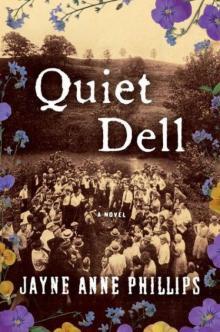 Quiet Dell: A Novel
Quiet Dell: A Novel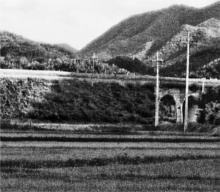 Lark and Termite
Lark and Termite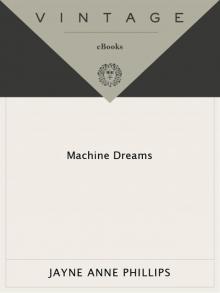 Machine Dreams
Machine Dreams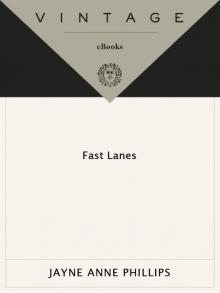 Fast Lanes
Fast Lanes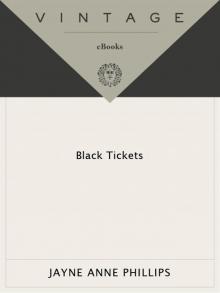 Black Tickets
Black Tickets